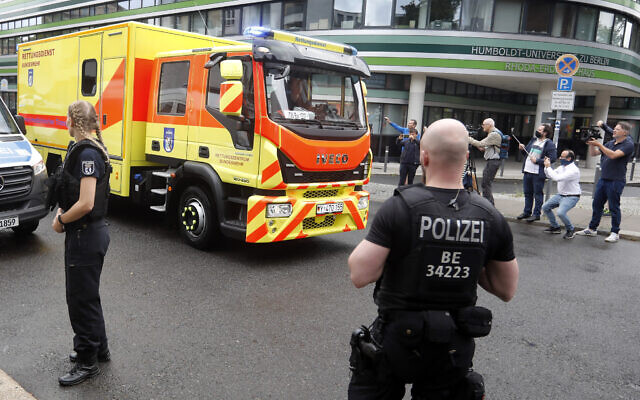Merkel’s spokesman says testing shows same chemical used to poison former Russia spy Sergei Skripal and his daughter was detected in Alexei Navalny.
BERLIN — The German government says tests performed on samples taken from Russian opposition leader Alexei Navalny showed the presence of the Soviet-era nerve agent Novichok.
Navalny, a politician and corruption investigator who is one of Russian President Vladimir Putin’s fiercest critics, fell ill on a flight back to Moscow from Siberia on August 20 and was taken to a hospital in the Siberian city of Omsk after the plane made an emergency landing.
He was later transferred to Berlin’s Charite hospital, where doctors last week said there were indications that he had been poisoned.
Chancellor Angela Merkel’s spokesman, Steffen Seibert, said in a statement Wednesday that testing by a special German military laboratory had shown proof of “a chemical nerve agent from the Novichok group.”
in green biohazard encapsulated suits investigate the site where Russian
spy Sergei Skripal and his daughter Yulia were found on March 4 in critical
condition at The Maltings shopping center in Salisbury, southern England.
(AFP Photo/Ben Stansall)
Novichok, a Soviet-era nerve agent, was used to poison former Russian spy Sergei Skripal and his daughter in Britain. It is a cholinesterase inhibitor, part of the class of substances that doctors at the Charite initially identified in Navalny.
Seibert said the German government will inform its partners in the European Union and NATO about the test results. He said that it will consult with its partners in light of the Russian response “on an appropriate joint response.”
Navalny’s allies in Russia have insisted he was deliberately poisoned by the country’s authorities, accusations that the Kremlin rejected as “empty noise.”
The Russian doctors who treated Navalny in Siberia have repeatedly contested the German hospital’s conclusion, claiming they had ruled out poisoning as a diagnosis and that their tests for poisonous substances had “come back negative”.
(Times of Israel).
